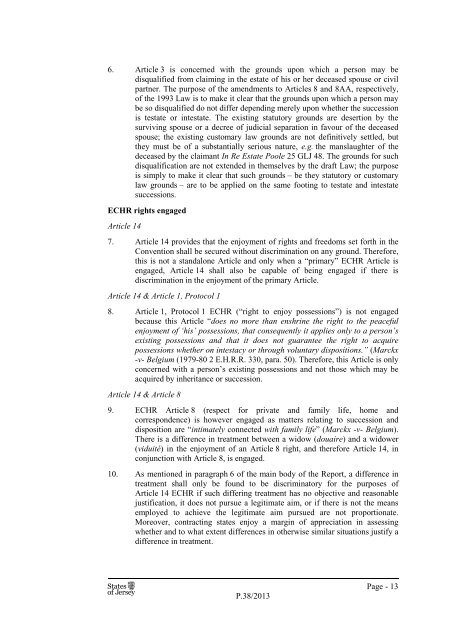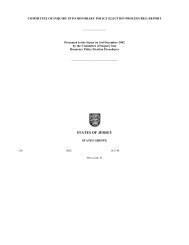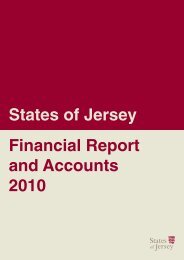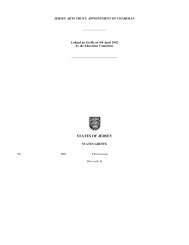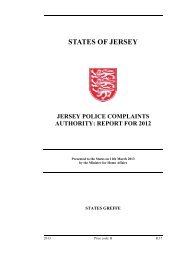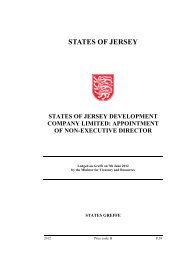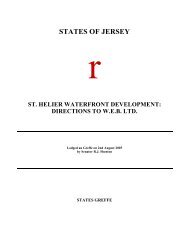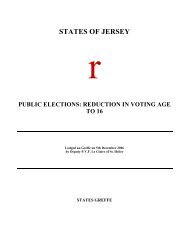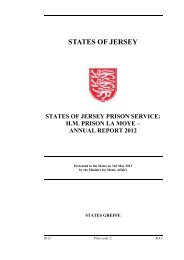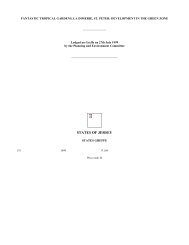Draft Wills and Successions (Amendment No. 2 ... - States Assembly
Draft Wills and Successions (Amendment No. 2 ... - States Assembly
Draft Wills and Successions (Amendment No. 2 ... - States Assembly
Create successful ePaper yourself
Turn your PDF publications into a flip-book with our unique Google optimized e-Paper software.
6. Article 3 is concerned with the grounds upon which a person may bedisqualified from claiming in the estate of his or her deceased spouse or civilpartner. The purpose of the amendments to Articles 8 <strong>and</strong> 8AA, respectively,of the 1993 Law is to make it clear that the grounds upon which a person maybe so disqualified do not differ depending merely upon whether the successionis testate or intestate. The existing statutory grounds are desertion by thesurviving spouse or a decree of judicial separation in favour of the deceasedspouse; the existing customary law grounds are not definitively settled, butthey must be of a substantially serious nature, e.g. the manslaughter of thedeceased by the claimant In Re Estate Poole 25 GLJ 48. The grounds for suchdisqualification are not extended in themselves by the draft Law; the purposeis simply to make it clear that such grounds – be they statutory or customarylaw grounds – are to be applied on the same footing to testate <strong>and</strong> intestatesuccessions.ECHR rights engagedArticle 147. Article 14 provides that the enjoyment of rights <strong>and</strong> freedoms set forth in theConvention shall be secured without discrimination on any ground. Therefore,this is not a st<strong>and</strong>alone Article <strong>and</strong> only when a “primary” ECHR Article isengaged, Article 14 shall also be capable of being engaged if there isdiscrimination in the enjoyment of the primary Article.Article 14 & Article 1, Protocol 18. Article 1, Protocol 1 ECHR (“right to enjoy possessions”) is not engagedbecause this Article “does no more than enshrine the right to the peacefulenjoyment of ‘his’ possessions, that consequently it applies only to a person’sexisting possessions <strong>and</strong> that it does not guarantee the right to acquirepossessions whether on intestacy or through voluntary dispositions.” (Marckx-v- Belgium (1979-80 2 E.H.R.R. 330, para. 50). Therefore, this Article is onlyconcerned with a person’s existing possessions <strong>and</strong> not those which may beacquired by inheritance or succession.Article 14 & Article 89. ECHR Article 8 (respect for private <strong>and</strong> family life, home <strong>and</strong>correspondence) is however engaged as matters relating to succession <strong>and</strong>disposition are “intimately connected with family life” (Marckx -v- Belgium).There is a difference in treatment between a widow (douaire) <strong>and</strong> a widower(viduité) in the enjoyment of an Article 8 right, <strong>and</strong> therefore Article 14, inconjunction with Article 8, is engaged.10. As mentioned in paragraph 6 of the main body of the Report, a difference intreatment shall only be found to be discriminatory for the purposes ofArticle 14 ECHR if such differing treatment has no objective <strong>and</strong> reasonablejustification, it does not pursue a legitimate aim, or if there is not the meansemployed to achieve the legitimate aim pursued are not proportionate.Moreover, contracting states enjoy a margin of appreciation in assessingwhether <strong>and</strong> to what extent differences in otherwise similar situations justify adifference in treatment.◊Page - 13P.38/2013


